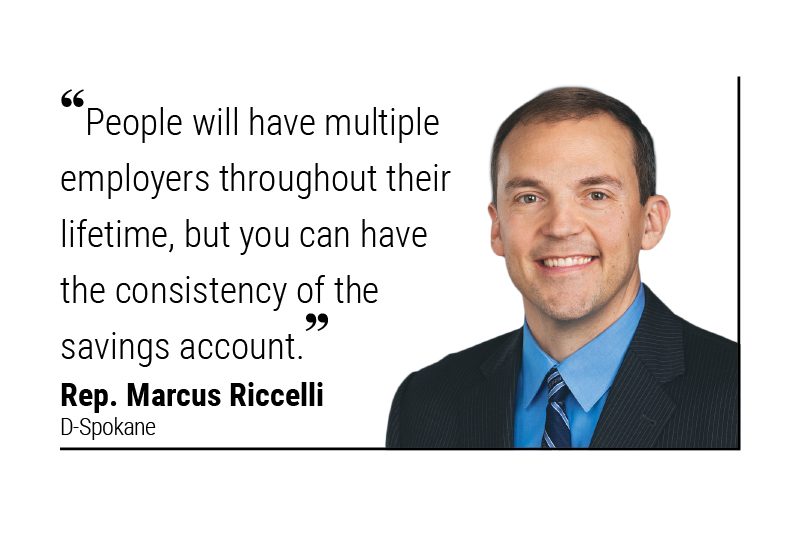
Proposed legislation to compel more retirement savings
To be called Washington Saves, state-run IRA draws some private-sector concerns

Proposed legislation currently working its way through the Washington state Senate aims to address a lack of retirement savings for many Washingtonians, although some in Spokane's private sector have concerns about the bill.
The proposed legislation, known as the Washington Saves program, would require most employers—those that have at least five full-time equivalent employees, have been located in Washington for at least two years, and don’t already offer a qualified retirement plan—to make available to employees a state-run individual retirement account.
Employers would take on additional administrative responsibilities, like processing payroll deductions and providing employees with relevant information, but they wouldn't have to contribute to the accounts or pay for the plan's administration.
“The district I represent in Spokane has a lot of working families who are struggling to pay for day-to-day things to get by, let alone save for retirement,” says Rep. Marcus Riccelli, D-Spokane, who sponsored the companion house bill for Washington Saves. “It’s all about having a foundation to age with dignity.”
Just over four in 10 private-sector employees in Washington don’t have access to retirement savings programs through their jobs, according to research from the AARP.
If the proposed legislation is passed, employees would be enrolled into the program automatically, with the ability to opt out at any time.
“Maybe they wouldn’t set up an IRA if it wasn’t for something like that, so making it automatic I think is important,” Riccelli says.
AARP research shows that Americans are about 15 times more likely to save for retirement when they have a plan through work and about 20 times more likely to save if contributions are automatic.
The Washington Saves program wouldn’t replace existing, employer-offered retirement savings plans. The IRAs would be portable, meaning they would follow individuals from job to job.
“People will have multiple employers throughout their lifetime, but you can have the consistency of the savings account,” Riccelli says.
A nine-person governing board would be created to design, develop, implement, maintain, and oversee the program. The board would contract with outside financial service firms to provide investment management.
The Washington Saves program, through Senate Bill 6069, passed through the ways and means committee earlier this month. If passed by the full Legislature and signed into law by the governor, the governing board would be directed to launch the program by January 2027, and may stagger implementation in stages, Riccelli says.
Riccelli says there wouldn’t be an additional tax created to support the proposed program, however administration fees would be collected from individual participants to defray the costs of administering the program, the bill's fiscal note shows. Estimated operating expenses for the program are about $460,000 in the 2023-2025 biennium, $1.8 million in the 2025-2027 biennium, and $2.4 million in 2027-2029.
The program also is intended to address existing racial inequities in retirement savings, Riccelli adds.
“Workers of color have had a disproportionate lack of access to retirement savings through work,” he says.
Larry Tripp, director of benefit services and trust administration for Associated Industries of the Inland Northwest, says there is a need for people to save for retirement through their employers.
"A lot of times, folks just don’t start investing,” Tripp says. “That hurdle is to just get started, to go open an IRA, to seek out a financial planner. This program seems to take away some of those hurdles and would allow folks a pretty easy way to start the process.”
Associated Industries offers employment law and human resources services for small and midsized organizations.
Tripp says one possible issue with the program is that some employers may have a difficult time processing contributions in a timely fashion, depending on the type of payroll system they use.
“That might be realistically one of the only places where employers might have a little bit of a headache,” Tripp says. “The amount that employers need to do should be fairly small.”
Sarah Carlson, the owner and founder of Fulcrum Financial Group LLC, has more concerns about the proposed program, however.
“I don’t necessarily think it’s going to accomplish what they’re hoping it’s going to accomplish,” Carlson says.
The additional responsibilities placed on employers may make it more challenging to do business in Washington, she says.
“I question how many small employers are already saddled with so many payroll and logistical things,” Carlson says.
Carlson is also concerned with the automatic enrollment aspect of the proposed program, saying it could hurt workers who don’t know money is being deducted from their paychecks.
“I think a better approach would be where someone can opt in,” she says.
Increasing the amount of financial education in public schools would be a better option for helping people help themselves, Carlson says.
Riccelli notes that he also is sponsoring House Bill 1915, an unrelated bill that would make financial education a graduation prerequisite and a required component of public education.
Despite her questions and concerns, Carlson says she recognizes the problem of not enough people saving for retirement.
“Getting people to put aside some money for their future, their long-term needs is a real challenge for all socioeconomic levels,” she says. “It is a problem.”





![Brad head shot[1] web](https://www.spokanejournal.com/ext/resources/2025/03/10/thumb/Brad-Head-Shot[1]_web.jpg?1741642753)